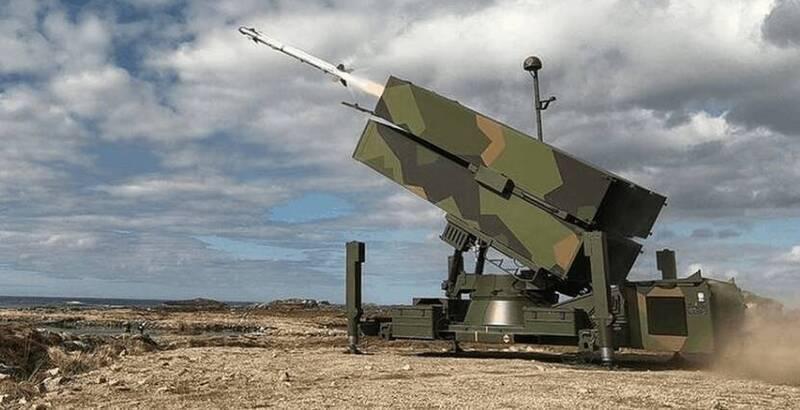One of the three new weapon procurement contracts signed with the US last year is to be delivered by the end of this year, the Ministry of National Defense announced today.
The three contracts are for Norwegian Advanced Surface-to-Air Missile Systems (NASAMS), an L-band electronic array radar and a non-L-band electronic array radar, the ministry said.
Given the frequent military activities in the Taiwan Strait by the Chinese Communist Party (CCP), the NASAMS and new radar systems will deepen Taiwan’s air defense capabilities, the ministry said.

Photo courtesy of the Norwegian Ministry of Defense
NASAMS have been used effectively in Ukraine, offering up automated detection capability, distributed firepower capabilities, a supporting command and control component, the ministry added.
The two new radar systems will improve detection rates and be resistant to jamming or interference, the ministry said.
NASAMS integrates the MPQ-64 “Sentinel,” multiple types of short and medium-range air defense missiles, and the Link 16 military tactical data link, allowing it to defend against aircraft within a range of 40 to 50 kilometers.
NASAMS will be deployed in Greater Taipei, with one located in Taipei’s Songshan District (松山) and the other in New Taipei’s Tamsui District (淡水), as both locations would be crucial in defending the capital, the ministry said.
The electronic array systems will be spread across the country, the ministry added.
NASAMS has performed well in Ukraine, making it a priority item for the US to recommend to Taiwan as part of the country’s push to increase its asymmetric warfare capabilities, defense expert Mei Fu-hsing (梅復興) said.
Unlike several other arms sales, Mei said, this system aligns well with that goal.
The US government announced on Oct. 26 last year that it would notify the US Congress of the agreements, totaling US$1.988 billion.
This is the 17th arm sale to Taiwan under outgoing US President Joe Biden.
The contract for NASAMS amounts to NT$10.31 billion (US$312.7 million), has a fulfillment date of Dec. 27 of last year, and will run until Feb. 25, 2034.
The L-band electronic array radar will cost NT$6.42 billion and run until 2030, while the non-L model will cost NT$7.61 billion and expire at the same time.

The Ministry of Economic Affairs has fined Taobao NT$1.2 million (US$36,900) for advertisements that exceeded its approved business scope and ordered the Chinese e-commerce platform to make corrections in the first half of this year or its license would be revoked. Lawmakers have called for stricter supervision of Chinese e-commerce platforms and more stringent measures to prevent China from laundering its goods through Taiwan as US President Donald Trump’s administration cracks down on origin laundering. The legislature’s Finance Committee yesterday met to discuss policies to prevent China from dumping goods in Taiwan, inviting government agencies to report on the matter. Democratic Progressive Party

Taiwan and its Pacific ally Tuvalu on Tuesday signed two accords aimed at facilitating bilateral cooperation on labor affairs, according to Taiwan’s Ministry of Foreign Affairs (MOFA). The governments inked two agreements in Taipei, witnessed by Foreign Minister Lin Chia-lung (林佳龍) and visiting Deputy Tuvaluan Prime Minister Panapasi Nelesone, MOFA said in a news release. According to MOFA, the agreements will facilitate cooperation on labor issues and allow the two sides to mutually recognize seafarers’ certificates and related training. Taiwan would also continue to collaborate with Tuvalu across various fields to promote economic prosperity as well as the well-being of their

Taiwan would welcome the return of Honduras as a diplomatic ally if its next president decides to make such a move, Minister of Foreign Affairs Lin Chia-lung (林佳龍) said yesterday. “Of course, we would welcome Honduras if they want to restore diplomatic ties with Taiwan after their elections,” Lin said at a meeting of the legislature’s Foreign Affairs and National Defense Committee, when asked to comment on statements made by two of the three Honduran presidential candidates during the presidential campaign in the Central American country. Taiwan is paying close attention to the region as a whole in the wake of a

NEW WORLD: Taiwan is pursuing innovative approaches to international relations through economics, trade and values-based diplomacy, the foreign minister said Taiwan would implement a “three-chain strategy” that promotes democratic values in response to US tariffs, Minister of Foreign Affairs Lin Chia-lung (林佳龍) said. Taiwan would aim to create a “global democratic value chain,” seek to capitalize on its position within the first island chain and promote a “non-red supply chain,” Lin was quoted as saying in the ministry’s written report to the Legislative Yuan submitted ahead of the legislature’s Foreign Affairs and National Defense Committee meeting slated for today. The Ministry would also uphold a spirit of mutual beneficial collaboration, maintaining close communication and consultations with Washington to show that Taiwan-US cooperation